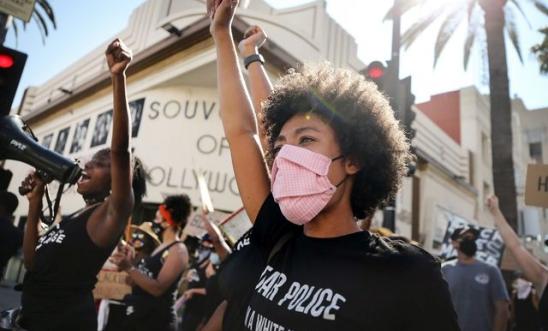
Press releases
USA: NYPD ordered to disclose 2,700 documents detailing surveillance of Black Lives Matter protests following lawsuit

New York Supreme Court Judge rules in favour of a joint Amnesty International and the Surveillance Technology Oversight Project lawsuit against the NYDP for refusing to disclose records
‘New Yorkers demanding racial justice have a right to know the full details of NYPD’s use of facial recognition technology during the BLM protest’ - Matt Mahmoudi
The New York Police Department (NYPD) has been ordered to disclose thousands of records of how the force procured and used facial recognition technology against Black Lives Matter (BLM) protesters, after the New York Supreme Court ruled in favour of Amnesty International and the Surveillance Technology Oversight Project (S.T.O.P.) on their joint Article 78 lawsuit.
In September 2020, Amnesty International USA filed a public records request under New York’s Freedom of Informational Law (FOIL) to obtain NYPD records on its surveillance of the historic BLM protests in 2020. The request was rejected by the NYPD along with a subsequent appeal. In July 2021, Amnesty and S.T.O.P, a privacy and civil rights group, announced the lawsuit against the NYPD for refusing to disclose its records.
New York Supreme Court Judge, Justice Laurence Love, declared on Friday that the NYPD's withholding of documents, and their argument that the volume of information would impart a burden on the police department, had been "utterly refuted" by Amnesty.
Judge Love ordered the NYPD to share 2,700 documents and emails between 1 March and 1 September 2020, related to procurement and usage of facial recognition surveillance at the BLM protests, upon resubmission of Amnesty’s original FOIL request. This will enable Amnesty and S.T.O.P. to thoroughly investigate the NYPD’s procurement and usage of facial recognition technology throughout New York City.
Matt Mahmoudi, Amnesty International’s Researcher on Artificial Intelligence and Human Rights, said:
“New Yorkers demanding racial justice have a right to know the full details of NYPD’s use of facial recognition technology during the BLM protests.
“This ruling recognises that the NYPD broke the law in withholding this information and is a significant step in holding the NYPD accountable for its use of discriminatory surveillance.
“It is a damning indictment of the NYPD’s lack of transparency and accountability to the public that it took a lawsuit to achieve this.
“A ban on facial recognition for mass surveillance is a much-needed first step towards dismantling racist policing in New York. We all have a right to peacefully protest without fear of surveillance.”
Albert Fox Cahn, Surveillance Technology Oversight Project Executive Director, said:
“It was wrong for the NYPD to surveil BLM protesters, and it was wrong to hide the evidence.
“This department systematically hides the ways it watches us, but today the surveillance cover up just won’t work.
“This ruling was crystal clear: the NYPD broke the law when it hid its records.
“When the police operate in the shadows and violate oversight laws, it’s not only a threat to public safety, but to democracy.
“I hope that Mayor Adams’ NYPD quickly complies with the order. New Yorkers deserve to know how political dissent is policed in this city. More importantly, these records can help us prevent more abuses in the future.”
Facial recognition technology
Facial recognition exacerbates discriminatory policing and prevents the free and safe exercise of peaceful assembly, by acting as a tool of mass surveillance. Black and minority communities are at far greater risk of being targeted.
In February 2022, new research by Amnesty and partners revealed New Yorkers living in areas at greater risk of stop-and-frisk by police are also more exposed to invasive facial recognition technology. The analysis, part of the global Ban The Scan campaign, showed how the NYPD’s vast surveillance operation particularly affects people already targeted for stop-and-frisk across all five boroughs of New York City. In the Bronx, Brooklyn and Queens, the research also shows that the higher the proportion of non-white residents, the higher the concentration of facial recognition compatible CCTV cameras.
Amnesty is calling for a total ban on the use, development, production, sales, and export of facial recognition technology for mass surveillance purposes by both states and the private sector.